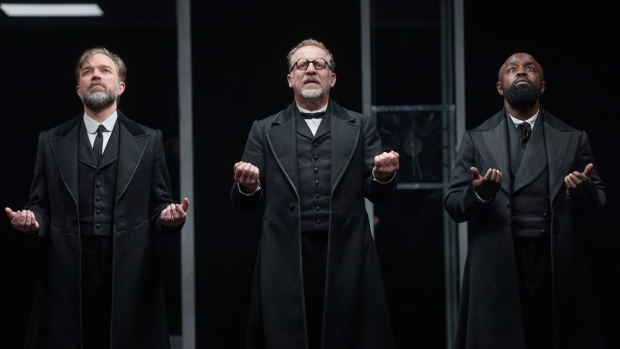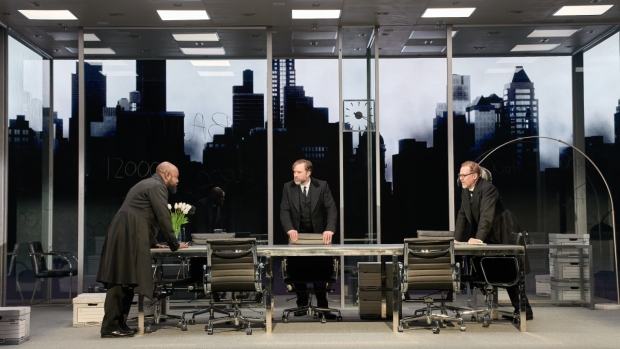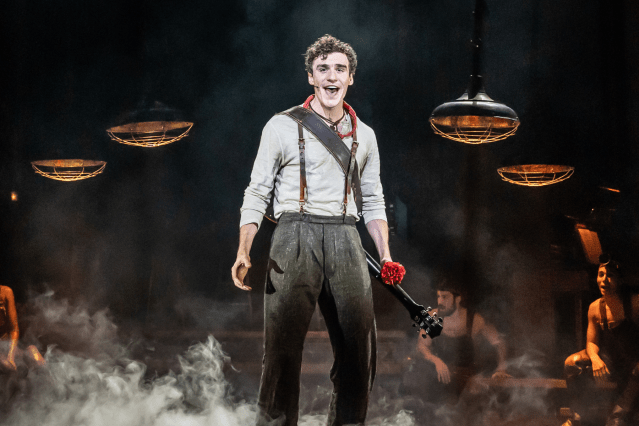”The Lehman Trilogy” at the Gillian Lynne Theatre – review

© Mark Douet
That makes Ben Power’s adaptation of Stefano Massini’s epic drama sound rather duller than it is. In fact, this production, directed by Sam Mendes, has the confidence to do the simplest of things utterly beautifully. It takes you by the hand and tells you a story of a family and their values and how they changed the face of America.
The tale is about the Lehman Brothers, an investment bank once regarded as too big to fail. The company’s collapse in 2008 precipitated the world financial crisis. That’s where the play begins, on Es Devlin’s monochrome glass and steel box set, which sits inside the cyclorama of the theatre’s stage, like a giant Tardis, turning to take us back to the beginning.
The start is Henry Lehman arriving in New York from Bavaria in 1844, stepping off the boat into the “magical music box of America” and opening a shop selling cotton goods in Montgomery, Alabama. From these humble beginnings, an empire grows that dominates Wall Street, changing in the process from a business that deals in things – cotton, coal, iron, steel – to one that trades in money itself.

© Mark Douet
“Everything changed again” is one of the refrains that runs through the play, binding its structure with poetic repetition and a fierce sense of shape and purpose. As the narrative shifts, the three actors playing the three original Lehmans – Henry, Emanuel and Mayer, the head, the arm and “the potato” who keeps peace between them – take on multiple roles.
They are traders, rabbis, lovers, wives, slipping between the characters with the help of an upturned collar or a nod of the head. The original trilogy of actors – Simon Russell Beale, Ben Miles and Adam Godley – created each of those characters for the first production in 2018, suiting their inflections to their own styles. It is extraordinary and rather wonderful to watch Nigel Lindsay, Michael Balogun and Hadley Fraser shape them in different ways.
Each is superb. I particularly loved Lindsay’s uptight Philip, pouring out his torrent of words as he pushes the business towards the future; the scene where he auditions a succession of potential wives, all played by Fraser with swift changes of voice and gesture is a comic joy; Fraser is wonderful too as the final Lehman, Bobbie, twisting in an ever quickening dance (choreography by Polly Bennett) as the firm hurtles towards the end. Balogun brings a particular tenderness to all the children he plays, and a sense of suppressed energy to Emanuel, fighting Henry and then Mayer to bring about change.
That sense of velocity the play possesses is increased by Luke Halls’ extraordinary video black and white designs that surround the action with an ever-changing landscape, and – like Jon Clark’s lighting – lend vivid colour only to the men’s nightmares about destruction which find themselves played out in reality as Wall Street crashes and they fight to survive. Nick Powell’s music, played on an upright piano below the stage by Yshani Perinpanayagam, creates a shifting undertow, full of melancholy melodies and bright hopes.
It’s an astonishing achievement, weaving family drama and the history of America into its rich pattern, losing its grip only slightly in the final act when there is simply too much story to tell, and when the Lehmans themselves lose control of their business. Oddly, slightly longer might have been even better. As it is, it is a unique and very special piece, a panoramic history that never loses sight of human detail and human cost.














